Thousands of marchers took to the streets in London over the past weekend to stand in solidarity with Hong Kong, just days before the Chinese National Day on October 1st.
The event “Fight Against Tyranny, Stand With Hong Kong”, publicised on Facebook and Telegram, the encrypted messaging app popular amongst Hong Kong protesters, began shortly after 1 p.m. outside the Chinese Embassy at Portland Place, Marylebone on Saturday (September 28th).
Organisers of the event said it has been four months since the Anti-Extradition Law Amendment Bill demonstrations began, and the movement has morphed into “a battle for Hong Kong’s autonomy, justice for victims of police brutality, and genuine democracy”.
“We have not been fooled by the Hong Kong Government’s insincere attempts at reconciliation,” they said. “Instead, we have directed our resistance towards the roots of this chaos – the tightening grip of Chinese authorities on the ‘puppet’ Hong Kong Government.”
The event started with a Uyghur and a Tibetan speaker denouncing the acts of repression and violations of human rights by the Chinese Communist regime.
Participants chanted slogans such as “Liberate Hong Kong; revolution of our times”, “Five demands, not one less”, and “No rioters, only tyrants” in both Cantonese and English, before singing the protest anthem “Glory to Hong Kong”.
“September 28th also marks the fifth anniversary of the Umbrella Movement, when millions of people occupied Hong Kong’s central districts to protest against the Chinese Government’s denial of genuine democratic elections,” the event coordinators said.
The marchers set off slightly after 1:30 p.m. from Portland Place en route to Trafalgar Square via Oxford Street, Chinatown, and Leicester Square, where participants stopped momentarily to chant slogans to passers-by and shoppers.
When the demonstrators arrived at Chinatown at 3:30 p.m., two counter-protesters carried the Chinese national flag and waved it in front of the rally attendees. Both individuals have left peacefully shortly after being jeered at.
The marchers arrived at Trafalgar Square after 4 p.m., where they chanted slogans and sang “Glory to Hong Kong” for nearly an hour before dispersing.
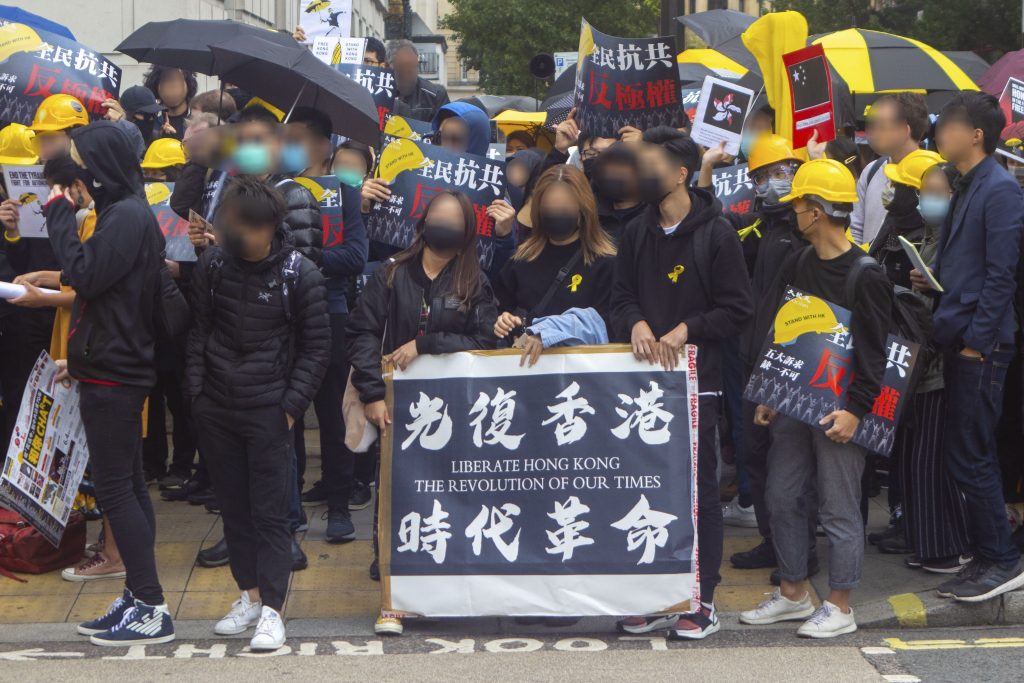
A marcher who wished to be anonymised as “Mary” said she attended the rally because she was a Hongkonger and supported free speech and democracy in Hong Kong.
“In these past three months, because of the Anti-Extradition (Law Amendment) Bill (protests in Hong Kong), which could result in a lot of arresting of pro-democracy people, it was a threat to freedom of speech in Hong Kong,” she said.
The demonstrator was also concerned about encroachments against the rule of law in Hong Kong and the “One Country, Two Systems” constitutional principle guaranteed by the Chinese Government and stipulated in accordance with the Sino-British Joint Declaration signed in 1984.
“The significance of this protest to the West is because Hong Kong is an international city, it holds a lot of foreign assets,” Mary said, adding that because the Hong Kong dollar is pegged with the U.S. dollar through a linked exchange rate system, any volatilities and fluctuations in the Hong Kong economy can impact foreign investments in Hong Kong and resulting in losses.
“It’s really important for the West to care: not only because the West – they stand for democracy; they stand for (the) freedom of speech – they have to uphold that value in Hong Kong.”
A Hongkonger living in the U.K. who preferred to be called J, said the initial “Stand With Hong Kong” rallies in June were “lethargic” and “ineffectual”, whereby despite having a few thousand participants, they were mostly middle-class with “little prior experience of protests”.
“The format replicated protests in the 1980s and 90s, with a clear ‘protest leader’ making poor speeches,” he said. “Few protesters had any understanding of the narratives on the frontlines in Hong Kong, and barely anyone shouted any slogans.
“By September, however, this had become substantially more effective. Almost all protesters who turned up knew the slogans and songs inside out, and many wore ‘full gear’,” J added, in reference to the solidarity marchers who donned safety helmets and wore gas masks.
“The march for two to three hours never lost intensity. I believe these rallies are becoming closer connected with the frontlines in Hong Kong and will become substantially more effective in the future.”
Similar rallies have been organised in 24 countries and 65 cities on Saturday (September 28th) and Sunday (September 29th), just days after the Hong Kong Chief Executive Carrie Lam has organised a “community dialogue” town hall event in the city.
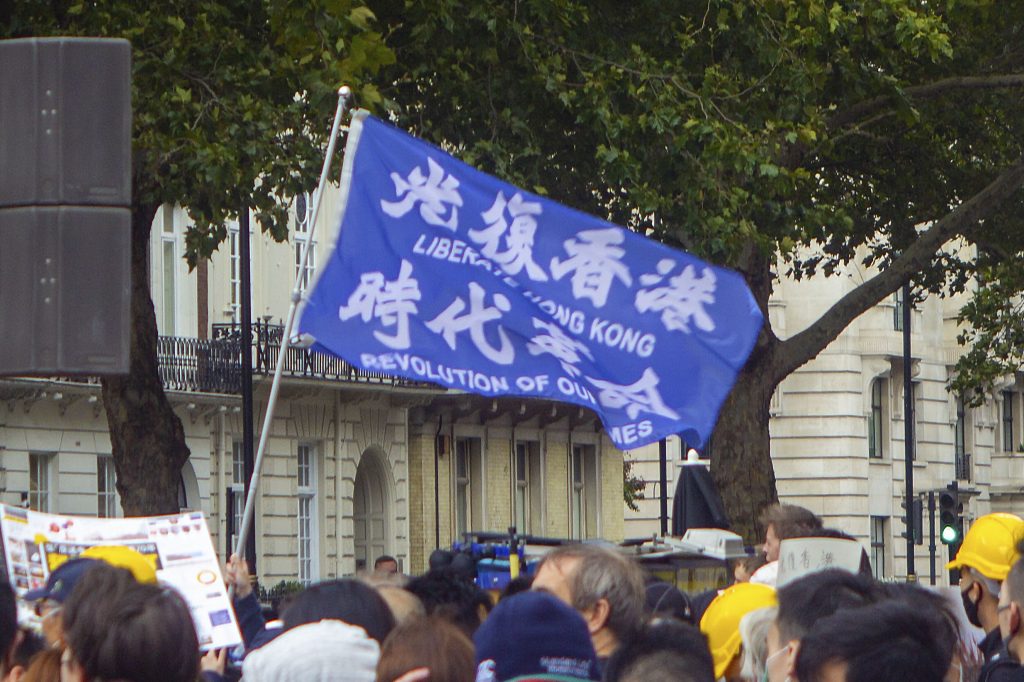
French journalist Raphael Blet, who is based in Hong Kong, said these worldwide rallies are “a direct challenge to Beijing’s principle that Hong Kong’s affairs should be dealt with locally”.
“This movement is internationalising Hong Kong’s political debate, be it through the proposed Human Rights and Democracy Act or the many overseas rallies,” the former South China Morning Post journalist said.
“It brings Hong Kong’s politics to the international arena with opposing camps confronting each other till the United Nations: the U.N. speech of singer Denise Ho or (the) testimony of Joshua Wong in (the U.S.) Congress is quite unprecedented to the extent that non-State actors are rarely given such privileges.
“We are witnessing a parallelisation of Hong Kong’s politics: one represented by pro-Beijing business interests and the other by pro-democracy ones, often coming from the arts or legal sector,” Mr. Blet said, adding that Beijing perceives opposition members who have been “given the red carpet” and “treated as de facto Hong Kong representatives” as a “definite threat” to its sovereignty over Hong Kong.
An impromptu solidarity rally was held at Piccadilly Circus on Wednesday (October 1st) evening, with hundreds participating and condemning the excessive use of force by the Hong Kong Police earlier that day in Hong Kong.
The Anti-Extradition Law Amendment Bill movement began when the H.K.S.A.R. Government proposed to amend the Fugitive Offenders Ordinance, allowing local authorities to extradite criminal fugitives in Hong Kong to territories where Hong Kong does not have extradition agreements with, including mainland China and Taiwan.
The amendment exercise was prompted by the murder of Poon Hiu-wing by her boyfriend Chan Tong-kai in Taiwan in 2018.
Opponents of the Bill feared that it would undermine the city’s “high-degree of autonomy” as laid out in the Basic Law of Hong Kong, Hong Kong’s mini constitution, by subjecting its residents under the jurisdiction of mainland China, thereby impacting and infringing its civil liberties in spite of reassurances from the H.K.S.A.R. Government.
The protesters in Hong Kong have listed five demands – which include the complete withdrawal of the Extradition Law Amendment Bill; the retraction of the characterisation of the June 12th protests as “riots”; the releasing and pardoning of all arrested and prosecuted protesters; the establishment of an independent commission of inquiry to alleged police brutality; and the universal suffrages of both the Legislative Council and the Chief Executive elections, as well as the immediate resignation of the Chief Executive Carrie Lam – after riot control weapons were used to disperse protesters on June 12th.
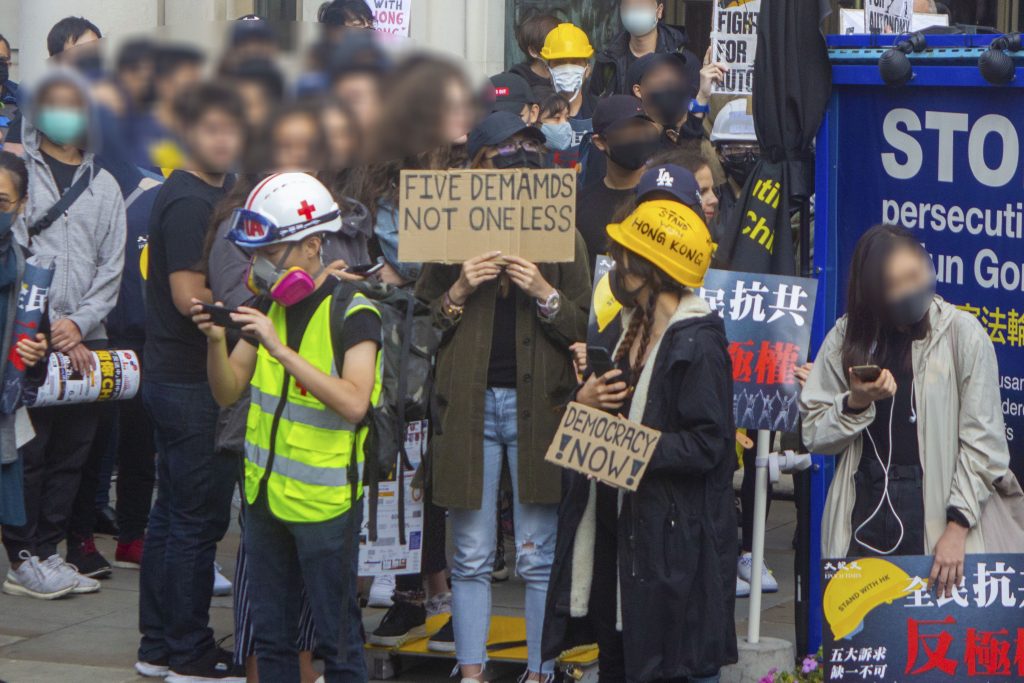
Since the first Anti-Extradition Law Amendment Bill protest on June 9th, there have been dozens of demonstrations and rallies of similar nature to call upon the Hong Kong Government to withdraw the Bill completely.
Although Chief Executive Lam formally withdrew the Bill on September 4th, the Hong Kong Police Force have been criticised for using “excessive force” in dispersing protesters throughout the past four months, such as firing of tear gas in densely-populated residential areas; using rubber bullets, plastic bullets, and bean-bag rounds indiscriminately; as well as violently detaining and beating up of protesters.
Protests on October 1st, which coincided with the Chinese National Day and the 70th anniversary of the proclamation of the People’s Republic of China, were the bloodiest and most violent to date.
More than 1,400 tear gas shots, 900 rubber bullets, 190 bean-bag rounds, 239 plastic bullets, and 6 live ammunition were fired, injuring 74 people, with two critically wounded and two severely wounded. 269 people were arrested on the same day.
In response to the scuffles which took place on October 1st, the Foreign Secretary Dominic Raab M.P. condemned the use of live ammunition by the Hong Kong police as “disproportionate”, and said it “only risks inflaming the situation”.
Man-Kei Tam, the Director of Amnesty International Hong Kong, urged the authorities in Hong Kong to launch a “prompt and effective investigation” into the sequence of events which has left a protester critically wounded.
“The shooting of a protester marks an alarming development in Hong Kong Police’s response to protests,” he added. “Police should only use lethal force in response to an imminent threat of death or serious injury and only as a last resort.”
Nicholas Bequelin, the East Asia Director at Amnesty International, also said: “Given the pervasiveness of the abuses we found, it is clear that the Hong Kong Police Force is no longer in a position to investigate itself and remedy the widespread unlawful suppression of protesters.
“Amnesty International is urgently calling for an independent, impartial investigation aimed at delivering prosecutions, justice, and reparation, as there is little trust in existing internal mechanisms such as the Independent Police Complaints Commission.”
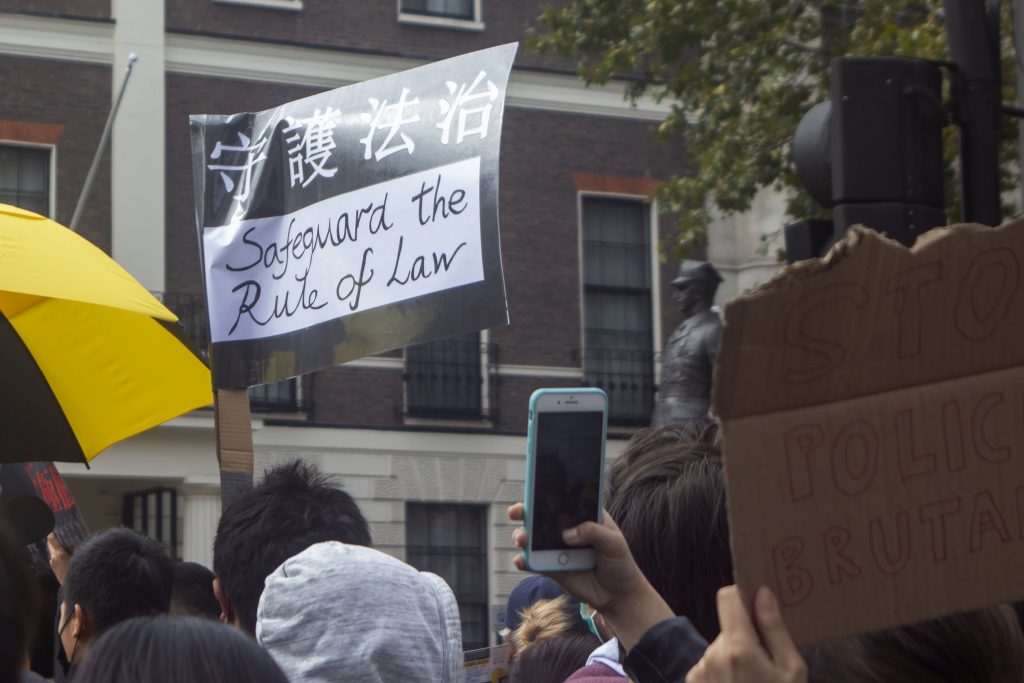
It is estimated that more than 2,000 people have been injured, and up until September 27th, 1,596 people have been arrested with charges such as possessing an offensive weapon, unlawful assembly, and criminal damage according to the Hong Kong Police Force.
With regard to the National Day protests and worldwide “anti-totalitarianism” solidarity rallies, French journalist Raphael Blet said although the Chinese Central Government would have preferred to have had a “protest-free” 70th anniversary, he did not think that “this is what matters most”, since “no matter what, the grandiose military parade in Beijing goes on”.
“However,” the former South China Morning Post journalist added, “we may want to look into the role of the media: for Beijing, this 70th anniversary is an opportunity to reflect on China’s development and highlight its military might to the world.
“Dignitaries, as well as media representatives from all over the world, have been invited. This is a one-off opportunity for the world to get a grasp of China’s new advancements but it is also a great one for China to promote its power, both hard and soft as well as the ‘China dream’.”
Mr. Blet analysed that despite China having its “communication organs” such as China Global Television Network and Xinhua News Agency, it also relies on the international media and hopes its 70th anniversary parade gets covered.
“So far, Hong Kong protests were the main focus and China’s 70th anniversary is rarely mentioned – and when it is, it is often part of a negative story that some may call ‘China-bashing’.”
On the other hand, J, a Hongkonger residing in the U.K., perceived the National Day protests in Hong Kong more pessimistically.
“After a period of trialling concessions, such as the withdrawal of the Extradition (Law Amendment) Bill, the Hong Kong Government and the Chinese Communist Party have abandoned any pretence for peace.
“October 1st is the official pivot towards a hard-line crackdown – first through ramping up police suppression, then through bypassing legislative protections through emergency legislation, and the imposition of ‘white terror’ across the commercial and political realms,” he said.
The Hongkonger added that whilst many protesters would have accepted “more mild” concessions, such as the withdrawal of the Extradition Law Amendment Bill, in June, October 1st was a “major pivot” towards a situation where no concessions could be made until the protesters’ “five demands” have been met.
“To me, it was a major sign that protesters had shifted from a ‘protest’ mind-set to a ‘revolutionary’ mind-set, where the system itself needs to be replaced or removed.”
Reporter’s note: This story has been updated on October 8th.

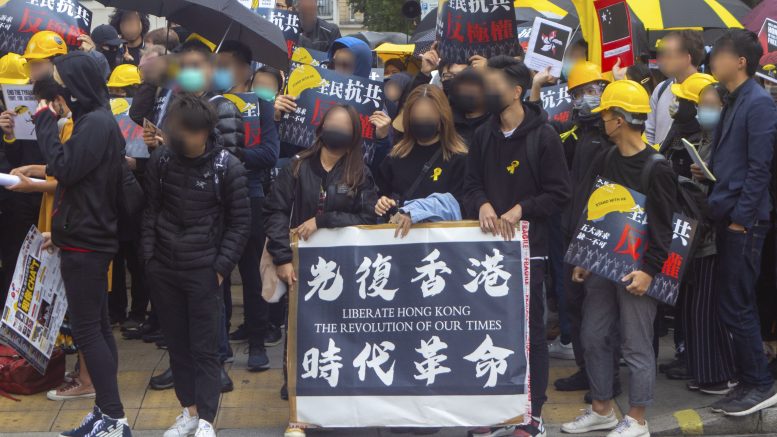
Be the first to comment on "Thousands in London march showing solidarity with Hong Kong as the city reels"